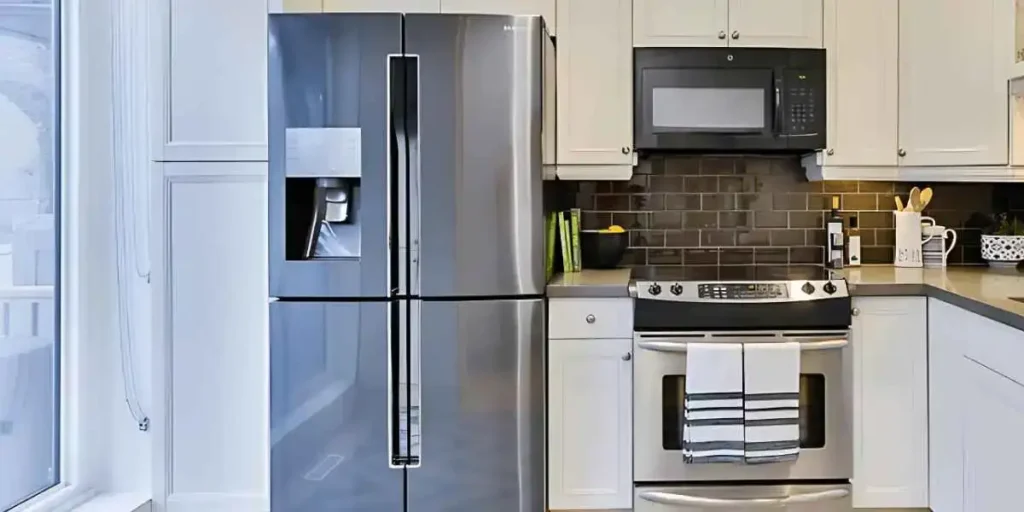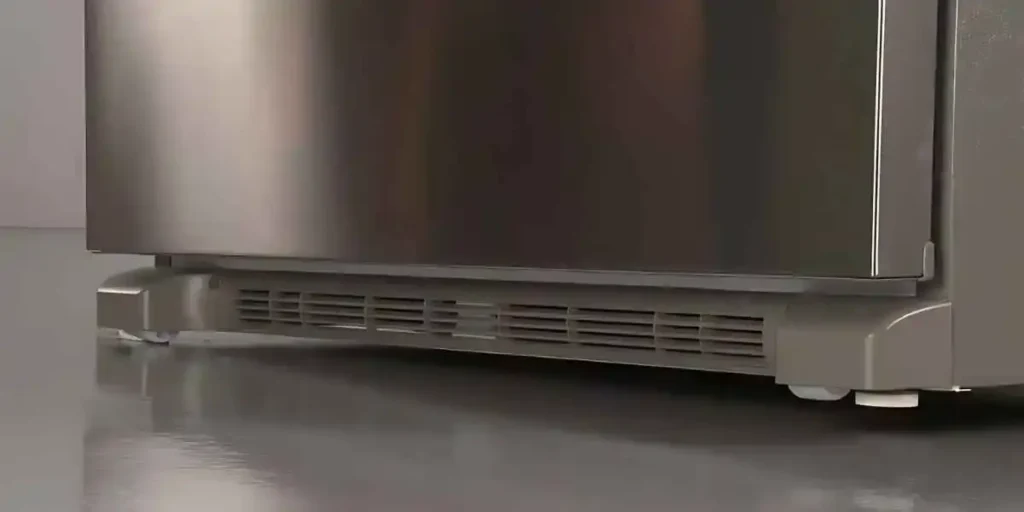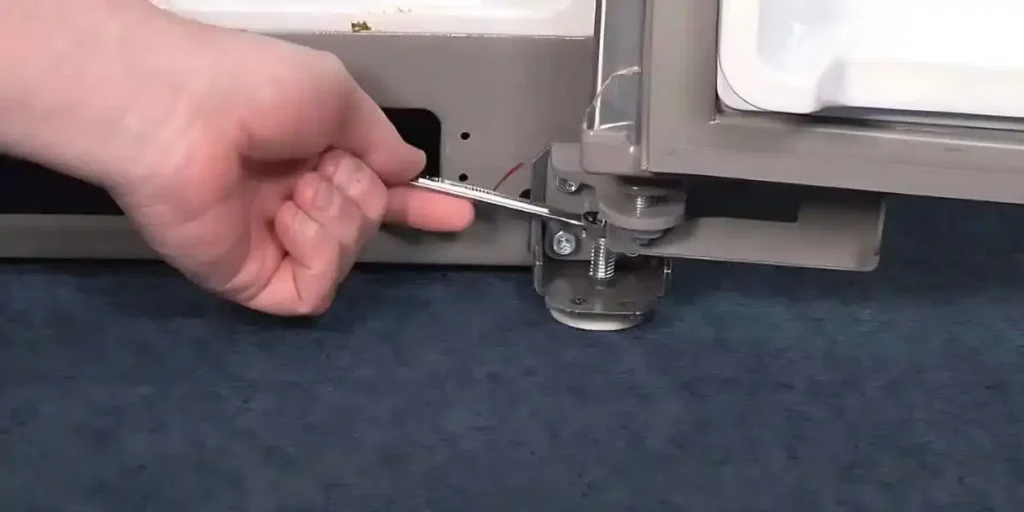Ge Refrigerator Noise Stops When Door Open: Silence the Buzz
We may earn affiliate fees for purchases using our links (at no additional cost to you).
Is your refrigerator making strange noises? Ever wondered why the noise stops when you open the door?
Let’s uncover the secrets behind GE refrigerator noises. We’ll explore the hidden causes, troubleshooting tips, and how to restore peace in your kitchen.

GE Refrigerator Noise Stops When Door Open
If you notice the noise in your GE refrigerator stops when you open the door, the issue may lie with the evaporator fan. It could be hitting something or being defective.
Sometimes, dirt build-up can cause a buzzing sound. The fan automatically turns off when the doors open, explaining why the noise stops.
10 Reasons For Noise In GE Refrigerators And Stops When Door Open

1. Loose or Misaligned Components
When certain components in your GE refrigerator, such as the condenser fan or motor, become loose or misaligned, they can produce noise.
Check for loose screws or bolts and ensure all parts are properly aligned.
2. Faulty Evaporator Fan
A faulty evaporator fan is a common culprit behind refrigerator noise. If the fan blades are damaged, hitting something, or worn out, they can generate noise.
Consider inspecting and replacing the fan if necessary.
3. Damaged Fan Motor
A damaged fan motor can lead to unusual noises in your GE refrigerator. Over time, the motor may wear out or develop faults.
If you suspect a faulty motor, it’s advisable to seek professional assistance for repairs or replacement.
4. Vibrating or Worn-out Compressor
A vibrating or worn-out compressor can generate noise in your GE refrigerator. The compressor may produce rattling, buzzing, or humming sounds if it’s loose or nearing the end of its lifespan.
Contact a technician to diagnose and address this issue.
5. Accumulated Debris
Accumulated debris, such as dust or food particles, can cause noise in your refrigerator.
Regularly clean the condenser coils, fan blades, and other accessible areas to remove any debris that may be contributing to the noise.
6. Uneven Surface or Leveling Issues

If your GE refrigerator is placed on an uneven surface or the leveling is off, it can create noise.
Ensure that the refrigerator is positioned on a level surface, and adjust the leveling feet if necessary to eliminate any noise caused by imbalance.
7. Water Line Vibrations
In some cases, noise in GE refrigerators can be attributed to vibrations from the water line.
Check if the water line is properly secured and not in contact with any hard surfaces.
Adding insulation or adjusting the positioning of the water line can help reduce vibrations.
8. Ice Maker Troubles
If your GE refrigerator has an ice maker, it may be a source of noise. Ice maker malfunctions, such as a faulty motor or a jammed mechanism, can lead to unusual sounds.
Inspect the ice maker and address any issues to restore normal operation and silence the noise.
9. Worn-out Gasket
A worn-out gasket, which seals the refrigerator door, can cause noise when the door is closed.
If you notice cracks, tears, or gaps in the gasket, it may be time to replace it. A properly functioning gasket ensures a snug fit and reduces noise.
10. Defrost Cycle Noise
GE refrigerators can produce noise during the defrost cycle as the ice melts off the evaporator coils. This is a normal operation and should not cause concern.
However, if the noise is excessively loud or persistent, it’s advisable to have the appliance checked by a professional.
How To Troubleshoot And Fix GE Refrigerator Noise

Check for Loose or Misaligned Components
When troubleshooting and fixing the noise in your GE refrigerator, start by inspecting for loose screws, bolts, or misaligned parts.
Sometimes, the vibrations from normal refrigerator operation can cause these components to become loose over time.
By tightening any loose screws or bolts and ensuring proper alignment of parts, you can eliminate potential sources of noise and restore the smooth operation of your refrigerator.
Examine the Evaporator Fan
The evaporator fan is responsible for circulating air inside your refrigerator. Over time, the fan blades can become bent or worn out, leading to noise issues.
To troubleshoot, locate the evaporator fan, typically found in the freezer compartment.
Visually inspect the fan blades for any signs of damage. If you notice bent or worn-out blades, replacing the fan to restore proper airflow and eliminate noise is recommended.
Inspect the Fan Motor
The fan motor powers the evaporator fan and ensures its smooth operation. If the motor becomes faulty, it can cause unusual noises in your refrigerator.
To inspect the fan motor, access the back of your refrigerator or the area behind the rear panel inside the freezer compartment.
Look for any visible damage or irregularities. If the motor appears damaged or not functioning correctly, it’s best to seek professional assistance for repair or replacement.
Assess the Compressor
The compressor is a vital component of your GE refrigerator, responsible for circulating refrigerant and maintaining the desired temperature.
If the compressor is vibrating excessively or producing unusual sounds, it may be the source of the noise problem.
To assess the compressor, listen closely while the refrigerator is running.
If you suspect an issue with the compressor, it’s recommended to contact a professional technician for diagnosis and potential repairs.
Clean the Condenser Coils and Fan Blades
Dust, dirt, and debris can accumulate on the condenser coils and fan blades, causing them to work less efficiently and produce noise.
To clean the condenser coils, locate them at the back of your refrigerator or beneath the front grill.
Use a vacuum cleaner with a brush attachment or a soft brush to remove debris gently.
Similarly, clean the fan blades by wiping them with a soft cloth. Regular maintenance and cleaning of these components help improve refrigerator performance and reduce noise.
Ensure Proper Leveling

An uneven refrigerator can lead to noise issues. Check if your GE refrigerator sits on a level surface to ensure proper leveling.
Adjust the leveling feet, usually located at the front or back of the appliance, to achieve balance.
A level refrigerator reduces vibrations and noise caused by an imbalanced position.
Secure the Water Line
If your GE refrigerator has a water dispenser or ice maker, vibrations from the water line can contribute to noise.
Check the water line connected to your refrigerator and ensure it is securely fastened.
Ensure that the line is not in contact with hard surfaces, which can cause vibrations and noise.
If necessary, reposition the line or add insulation to minimize vibrations and reduce noise.
Troubleshoot the Ice Maker
If your GE refrigerator is equipped with an ice maker, it’s essential to troubleshoot it if you suspect it’s causing the noise.
Look for any ice blockages or obstructions within the ice maker mechanism. Clear away any ice buildup that may be causing the noise.
Check the Door Gasket
The door seals should be tight to prevent warm air entering the refrigerator. If the door seals are damaged or worn, they can cause the refrigerator to work harder and make more noise.
To check the door seals, close the refrigerator door and see if there is any light coming through the cracks.
If you see the light, the door seals may need to be replaced.
Defrost The Refrigerator Regularly
Ice buildup can cause the evaporator fan to work harder and make more noise. To defrost your refrigerator, follow our instructions given below.
6 Steps To Defrost Your GE Refrigerator
Step 1: Remove all food and ice from the freezer.
- Take out all the food and ice from the freezer. You can put the food in a cooler or insulated bag or a bowl of cold water.
- If you have frozen items you don’t want to thaw, you can wrap them in newspaper or towels and put them in a separate container.
- Be sure to unplug the refrigerator before you start defrosting.
Step 2: Empty the water pan in the bottom of the freezer.
- If your refrigerator has a water pan, empty it out. This pan catches the water that drips from the defrosting coils.
- If your refrigerator doesn’t have a water pan, you can place a towel or newspaper in the bottom of the freezer to catch any water that melts.
Step 3: Leave the refrigerator doors open.

- This will help the ice to melt faster.
- If you have a lot of ice buildup, open the doors with a few wooden blocks or rolled-up towels.
Step 4: Use a plastic scraper to loosen and remove the ice from the freezer walls and ceiling.
- Be careful not to scratch the surfaces.
- You can also use a hair dryer on the cool setting to help melt the ice.
- If you have a lot of ice buildup, you may need to break it up with a hammer or screwdriver.
Step 5: Wipe up any water that has spilled.
- Be sure to dry the surfaces completely before you turn the refrigerator back on.
Step 6: Turn the refrigerator back on once the ice has melted.
- Wait for the refrigerator to cool down before you put the food back in.
Frequently Asked Questions About GE Refrigerator Noise
Is It Normal For My GE Refrigerator To Make A Noise When The Door Is Closed?
However, hearing loud or unusual noises even when the door is closed could indicate a problem.
It’s best to have a professional technician assess and address the issue.
Will The Noise In My GE Refrigerator Cause Any Damage To The Appliance?
Regular maintenance and prompt repairs can prolong the lifespan of your appliance.
How Can I Fix The Noise Issue In My GE Refrigerator?
First, identify the source of the noise by listening carefully. Check for loose components, clean the condenser coils, and ensure proper leveling.
If the noise persists, it’s advisable to consult a professional technician for a thorough diagnosis and repair.
Can A Noisy GE Refrigerator Affect Its Cooling Performance?
However, certain issues that cause noise, like a faulty fan or compressor, can affect the refrigerator’s ability to cool properly.
Addressing the noise issue promptly helps ensure optimal cooling efficiency.
Is There A Way To Reduce The Noise In My GE Refrigerator?
Keeping the refrigerator well-stocked and avoiding obstructions near the vents can minimize vibrations and noise.
Conclusion
When you notice that the noise in your GE refrigerator stops when you open the door, it’s likely related to the evaporator fan. This fan may be hitting something or could be defective.
Additionally, dirt build-up on the fan can cause buzzing sounds. The fan automatically turns off when the doors are open, explaining why the noise stops.
By addressing these potential causes and performing regular maintenance, you can effectively troubleshoot and fix the noise issue in your GE refrigerator.
This will help ensure a quieter and more pleasant kitchen environment for you to enjoy.